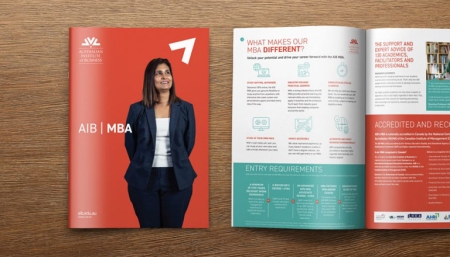Paul Mirabelle is a Board Director of 13SICK National Home Doctor Service, Australia’s largest network of home visiting doctors. We’re thrilled to announce that 13SICK has partnered with AIB, and Paul will be sharing his extensive knowledge and experience in strategic management with our students as an Industry Guest Lecturer.
Paul’s diverse career from law to healthcare
Throughout his career, Paul has worked with a range of medical service enterprises in key executive roles. But prior to entering the medical field, he was a Partner with The Boston Consulting Group and a barrister and solicitor in Canada. Paul holds a Bachelor of Laws and a Master of Business Administration (MBA) from the University of Western Ontario in Canada.
Upon completing his MBA in 1988, Paul moved to Australia, and with the exception of a three-year stint back in his homeland, he has lived here ever since. On his return to Australia, Paul landed his first CEO position in a healthcare company, specialising in radiology imaging. Moving on, his next role took him into the area of audiology as CEO of National Hearing Care. With Paul’s assistance, the company grew its network of clinics and expanded into India, before being bought in 2010 by Italian company, Amplifon SpA. After the acquisition, Paul stayed on as Executive Vice President, running the Asia-Pacific business until 2015.
In addition to his work with 13SICK, Paul sits on a number of healthcare boards including SunDoctors, a network of skin cancer clinics, and HealthShare, a health information company.
The fundamentals of strategic management
It is no doubt that strategic planning is central to the health of a company, and as Paul explains, both an internal and external perspective is required. “Internally, I think the important thing around strategy is it provides focus. You are clear about what you are doing and what you are committing to do over a tangible timeframe. Almost as importantly, it is telling you what you are not going to do. You have a finite number of resources you can deploy, be it your capital, staffing or time. Strategic management gives you that ability to really prioritise and focus how you are going to use those scarce resources.”
Externally – and this is the element that Paul feels can be neglected from a company’s strategic approach – it is recommended to look at the wider context in which the company is operating. That means considering what the competition is doing, as well as the regulatory framework and economic outlook. On this, Paul concludes, “The combination of that internal perspective and the external reflection is fundamental. If you have that, it provides the basis for setting a plan which you can then communicate and use to energise people.”
Strategy development also undoubtedly requires the consideration of technology. Today, technology is fundamental to how services are delivered, both in terms of cost and time, and changes the way that businesses engage with their customers or patients. In the past three years, 13SICK has experienced a significant shift in the way that patients contact the service, from phone calls to online, and increasingly across mobile devices. Doctors, too, are booked and deployed using online technology. He urges those who reject digitalisation to reconsider, “If you don’t think there is a role for technology, you have probably missed something.”
Paul is a fan of mission statements, but only if they inform actual strategic decision making. He points to an example from his days with TELUS, a telecommunications company back in Canada. Their tagline, reflecting their status as a high tech company offering a range of products and services, was
Making life easy. Rather than leaving it as a standalone line, the company created a culture that embraced it wholeheartedly. That meant that every time they introduced a new product or process, they stopped to consider whether it was as easy as it could be for the customer. This included looking at the user interface, the terminology used and how to help consumers understand how to best use the service.
As for how he leads companies to make the strategic changes that count, Paul favours short term rewards measured against simple and transparent KPIs, so that people can see how their performance directly affects their remuneration. But it’s not all about finance. “Culture is the fabric on which all of our actions every day are played out,” and without a strong culture and values, the financial rewards won’t follow. Especially in healthcare, where the needs of the patient are paramount, Paul believes that, “If you are not absolutely committed to ensuring that your customer, or your patient, is better off by virtue of having engaged with you, then you have lost something.”
Why your people are your greatest asset
Finally, he believes in building teams whose skill sets cannot be replicated. If your company’s secrets fell into the hands of the nearest competitor, would they be able to carry out the same work as well as you do? Paul believes that when you have a strong team, it creates a rare synergy that makes them irreplaceable. He remembers his days at National Hearing Care, where they ran an effective and professional front end process to get patients into hearing clinics. Since most people regard getting a hearing test as a tedious chore at best, their success required them to overcome some serious challenges. When other companies tried to replicate their technique, they would fail and revert to older methods. “That is an example, in my eyes, of having some rare skill sets within the organisation which actually provided us with competitive advantage,” Paul explained.
We certainly believe that our students will be better off by virtue of Paul’s strategic management insights, and we warmly welcome him on board.
Get to know AIB’s Industry Partners and growing team of exceptional Industry Guest Lecturers.




